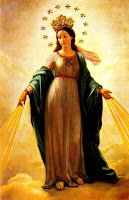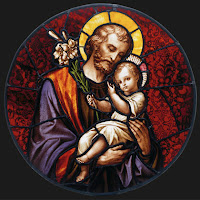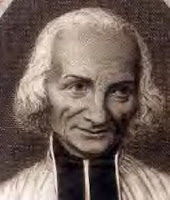Praised be Jesus, Mary, and Joseph!
In last week’s meditation on the
Mystery of the Most Holy Trinity, we saw that God wills that all his creatures
enter into the communion of his Trinitarian life: “The ultimate end of the
whole divine economy is the entry of God’s creatures into the perfect unity of
the Blessed Trinity.” (CCC, 260) He wishes us to have access into his Divine
Life which is a Communion of life and love. We may ask: How? How are we to
participate into the communal life of the Blessed Trinity. The Lord Jesus
answers this in today’s reading: “Just as the living Father sent me, and I have
life because of the Father, so also the one who feeds on me will have life
because of me.” Yes, you heard it right: he wants us to feed on him…to eat his
flesh and drink his blood. It might sound odd to you, but do not worry, it also
sounded the same way to the Jews who heard him. In fact they quarreled among
themselves: “How can this man give us his flesh to eat?” They thought they
heard him say that Jesus wanted them to eat his flesh. They just wanted to be
sure that they heard him right. And so Jesus confirmed what they heard: “Unless
you eat the flesh of the Son of Man and drink his blood, you cannot have life
in you.” As if it were not enough, he continued: “Whoever eats my flesh and
drinks my blood has eternal life and I will raise him on the last day.” Just in
case you did not understand him, Jesus reiterated: “For my flesh is true food
and my blood is true drink.” And so that there would be no further
misunderstanding, he repeats: “Whoever eats my flesh and drinks my blood
remains in me and I in him.”
 The words of Jesus undeniably
speak of the mystery of his Real Presence in the Holy Eucharist. The Eucharist
is truly the Body and Blood of Jesus. In the Eucharist, Jesus is truly present:
Body, Blood, Soul, and Divinity. Let there be no mistake about this. The
Eucharist is the Sacrament of the Presence of Christ. But let it not be
forgotten that the purpose of his Presence is to be offered as Sacrifice. At
the Last Supper, Jesus took bread and said: “This is my Body which will be
given up for you.” Likewise, he took the chalice of wine and said: “This is the
Chalice of my Blood which will be shed for you and for many for the forgiveness
of sins.” His Body is given up…offered
up. His blood is shed…poured out as a libation, a drink offering. And this is
why he wishes us to eat and drink his flesh and blood: partaking of sacrificial
food brings about the communion of the recipient with the God to whom the
sacrifice is being offered. In the Acts of the Apostles, the Apostles forbade
the gentile converts from eating meat offered to idols. This is because eating
the meat offered to idols would bring about communion between the eater and the
false gods to whom the meat was offered. In like manner, eating the flesh of
Jesus in Holy Communion brings about our communion with the Blessed Trinity to
whom the Sacrifice of the Mass is offered: “Just as …I have life because of the
Father, so also the one who feeds on me will have life because of me.”
Understand that when we approach the Altar for Holy Communion, we are not
receiving ordinary food. We will be eating the Body and Blood of Jesus himself.
This is the reason why we kneel for communion. This is why we receive communion
with great reverence and devotion. We are approaching Jesus himself truly
present in the Holy Sacrament of the altar. And in doing so, we enter into
communion with the Most Holy Trinity. Thus St. Pope John Paul said: the
Eucharist “is at one and the same time a sacrifice-sacrament, a communion-sacrament,
and a presence-sacrament.” (Redemptor Hominis, 20.) In the Holy Eucharist, we
have the abiding presence of the Lord Jesus whose body and blood is offered and
poured out for our salvation and in doing so, he brings us, the Church, into
communion with the Blessed Trinity. “The Eucharist is the sacrament of
sacrifice and communion. All of us who participate in it as sacrifice receive
it in communion. At the same time, we receive God’s gift of himself in the Holy
Spirit, whom Christ merited for us through his passion.” (John Paul II, Homily
of Mass for the Sick, June 14, 1987.)
The words of Jesus undeniably
speak of the mystery of his Real Presence in the Holy Eucharist. The Eucharist
is truly the Body and Blood of Jesus. In the Eucharist, Jesus is truly present:
Body, Blood, Soul, and Divinity. Let there be no mistake about this. The
Eucharist is the Sacrament of the Presence of Christ. But let it not be
forgotten that the purpose of his Presence is to be offered as Sacrifice. At
the Last Supper, Jesus took bread and said: “This is my Body which will be
given up for you.” Likewise, he took the chalice of wine and said: “This is the
Chalice of my Blood which will be shed for you and for many for the forgiveness
of sins.” His Body is given up…offered
up. His blood is shed…poured out as a libation, a drink offering. And this is
why he wishes us to eat and drink his flesh and blood: partaking of sacrificial
food brings about the communion of the recipient with the God to whom the
sacrifice is being offered. In the Acts of the Apostles, the Apostles forbade
the gentile converts from eating meat offered to idols. This is because eating
the meat offered to idols would bring about communion between the eater and the
false gods to whom the meat was offered. In like manner, eating the flesh of
Jesus in Holy Communion brings about our communion with the Blessed Trinity to
whom the Sacrifice of the Mass is offered: “Just as …I have life because of the
Father, so also the one who feeds on me will have life because of me.”
Understand that when we approach the Altar for Holy Communion, we are not
receiving ordinary food. We will be eating the Body and Blood of Jesus himself.
This is the reason why we kneel for communion. This is why we receive communion
with great reverence and devotion. We are approaching Jesus himself truly
present in the Holy Sacrament of the altar. And in doing so, we enter into
communion with the Most Holy Trinity. Thus St. Pope John Paul said: the
Eucharist “is at one and the same time a sacrifice-sacrament, a communion-sacrament,
and a presence-sacrament.” (Redemptor Hominis, 20.) In the Holy Eucharist, we
have the abiding presence of the Lord Jesus whose body and blood is offered and
poured out for our salvation and in doing so, he brings us, the Church, into
communion with the Blessed Trinity. “The Eucharist is the sacrament of
sacrifice and communion. All of us who participate in it as sacrifice receive
it in communion. At the same time, we receive God’s gift of himself in the Holy
Spirit, whom Christ merited for us through his passion.” (John Paul II, Homily
of Mass for the Sick, June 14, 1987.)
Jesus, I trust in you. O Mary conceived
without sin, pray for us who have recourse to thee!









No comments:
Post a Comment